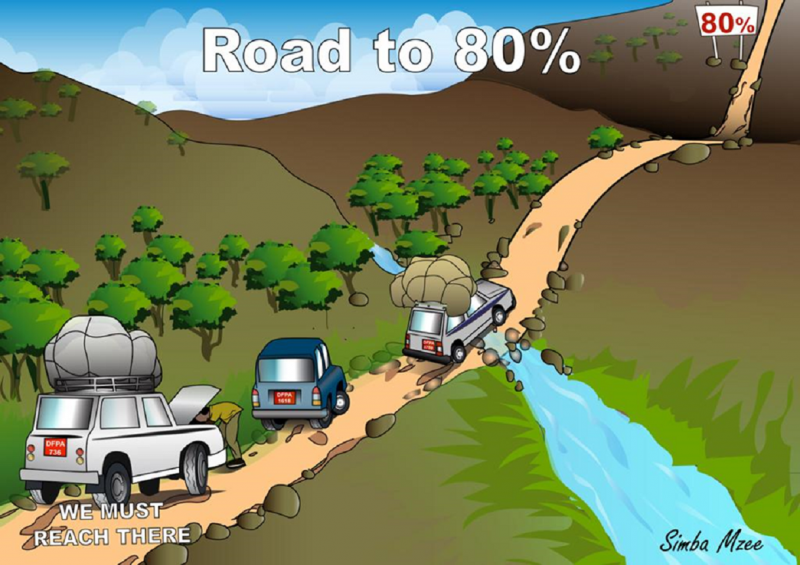Where We Work
See our interactive map


A Tohara Plus project car passes through a marketplace, distributing leaflets and flyers on HIV prevention in the field. The driver uses a speakerphone mounted on the car to raise community awareness about services available at the nearby health facility and outreach sites. Photo by Josh Estey for IntraHealth International.
Simba and his team of drivers work closely with health workers to help reach more men with services.
When IntraHealth International’s Tohara Plus team received new guidance last year that we should aim to achieve 80% of our annual targets in just 50% of the time, we knew it would take the whole team working together.
Delivering this service—which can lower a man's chances of contracting HIV through heterosexual intercourse by up to 60%—to that many men would require new efforts, strategies, and renewed motivation and energy from the whole team—including Simba Mzee and his team of 18 drivers.
As VMMC coverage increases in Tanzania, the number of uncircumcised men shrinks, and it becomes increasingly difficult to reach the men who want the service but haven’t yet gotten it.
Simba Mzee, head driver for Tohara Plus, created a graphic depicting the new guidance, which was met with enthusiastic support from his crew of drivers as well as the entire team in Mwanza.

Simba’s depiction of VMMC program field work features an accelerated scale-up of VMMC services in Tanzania. Art by Simba Mzee, head driver, Tohara Plus Project.
“I realized that more than ever before, we drivers have a big role to play in supporting health workers and the rest of the technical team,” Simba says. “We have to be on the move constantly—bringing health workers and support staff from one place to another, moving supplies and equipment, picking up and dropping off clients from distant communities at the VMMC facilities, and sharing ideas on how and where else we can find more clients.”
Simba’s efforts and those of the Tohara Plus team have paid off. Between October 2019 and March 2020, IntraHealth collaborated with regional teams to provide VMMC services for 156,527 adolescents and adult men in Mwanza, Mara, Shinyanga, and Simiyu regions. For the first time ever, the project achieved 77% of its annual target (203,590) before the end of the second quarter.
More than ever before, we drivers have a big role to play in supporting health workers and the rest of the technical team.
Simba and his team of drivers worked closely with health workers to:
“Sometimes drivers get to the facility during distribution of supplies and find there are no clients present,” Simba says. “The driver will take the initiative to go out into the community to distribute flyers and leaflets and make speakerphone announcements about the availability of VMMC services. Through these announcements, the number of clients interested in VMMC services has increased at the facilities.”
Community health workers booked clients ahead of time, as per the guidance from health workers and technical team. When a driver arrived at the facility, they followed up with the community health workers and picked up clients to bring them to the facility for VMMC services. Drivers also transported health workers from facilities that didn’t have as many clients to those that were in need of more trained health workers.
Project drivers were informed of sites that required additional supplies every day. Sometimes, sites gained an unexpectedly large number of clients but lacked sufficient supplies of sterile kits, portable sterilizers, and gas cylinders. In this case, drivers communicated with the technical advisors to identify sites that had fewer clients, then they picked up unused kits and redistributed them to the sites that needed them.
Since the onset of the COVID-19 pandemic, our team has been working to ensure the HIV-prevention services we provide—including VMMC—remain safe and accessible.
Tohara Plus has shifted from conducting outreach services and campaigns—which attract large crowds—to making services only available at specific static sites—and only for clients over 18 who don’t require an adult escort. This helps reduce the number of people in a facility at any given time.
When we first made this shift, we were providing services to around 580 men a week at 30 health facilities. Now we’re averaging 1,614 men every week at those 30 sites.
Tohara Plus is funded by the U.S. President's Emergency Plan for AIDS Relief (PEPFAR) through Centers for Disease Control (CDC) Tanzania to accelerate the scale up of VMMC services in four Lake Victoria regions of Tanzania.
Get the latest updates from the blog and eNews




